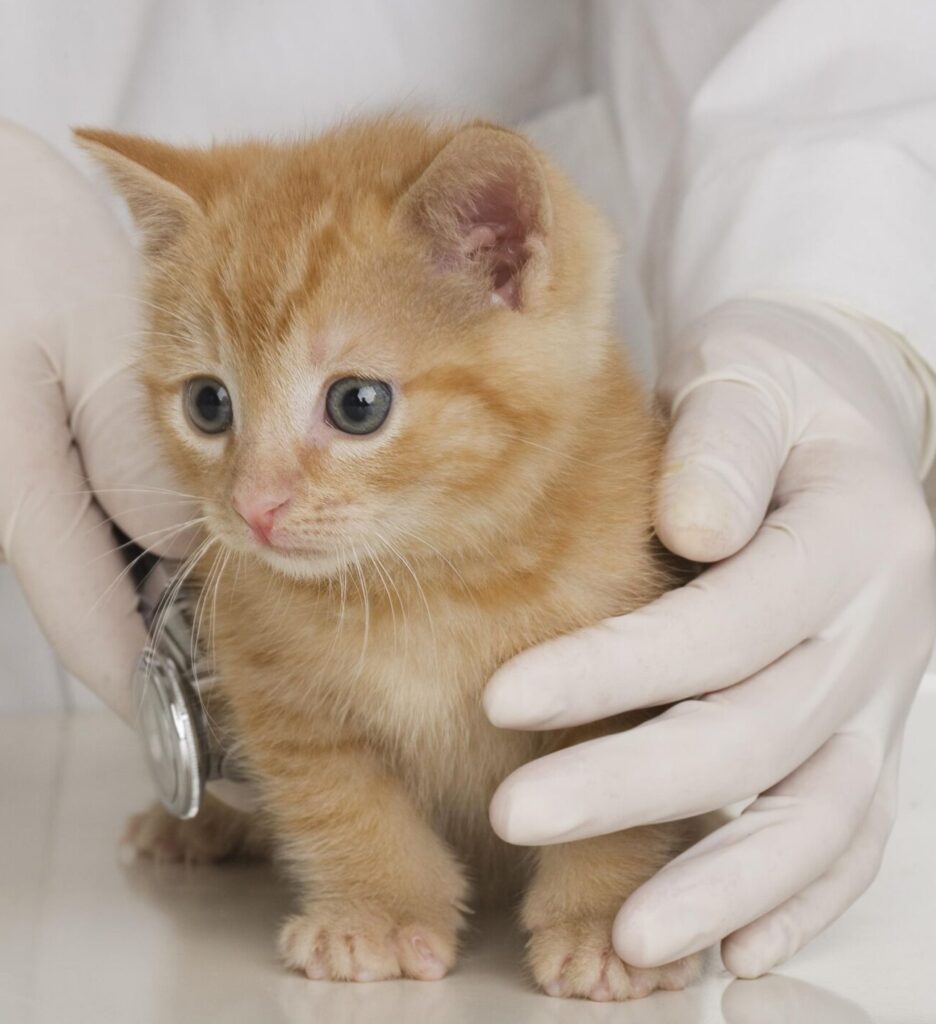

Puppies and Kittens
Everyone loves babies and your new puppy or kitten is no exception. But don’t allow that adorable face to distract you from a few important issues. Get your new youngster off to a good start physically, medically, and socially.
Environment
Physical issues include basic needs and the environment in which you raise your new puppy or kitten. A safe room and a place to sleep are primary factors for a young pet. Baby-proofing a room is as critical for an animal as it is for a human baby, especially if your new pet may spend periods of time unsupervised. Get down on the floor in your chosen space and see what your pet sees–electrical cords, small items that have been dropped or lost, and curtains, blankets, or other fabrics that can be chewed, swallowed, or climbed. Try to keep one room safe for your pet, a room you can close off from the rest of the house with durable flooring and a lack of dangerous or delicate items.
Crate Training
Crate training is popular with many dog owners and you may find your puppy takes well to space all his or her own. If you are interested in the art of crate training, download this instructional report, Crate Training: Making Obedience Training Fun and Easy. You may also enjoy the Crate Training website, which offers other links and resources as well.
Diet and Excercise
The appropriate diet, along with adequate exercise and playtime, is critical to the healthy development of your new pet. In addition, this time together will certainly help develop trust and establish your role in the youngster’s life. At your wellness visits, we will advise you on the right food for your pet and help you develop a suitable exercise and play program to develop strong muscles, good tone, and enjoyment in social interaction. The website, Pet Obesity Prevention is a good way to start on this subject. It has great information on maintaining a great diet and weight control. This website gives you great ideas on how you can Exercise With Your Pet, it is great for parents and kids to read and discuss together and may help to include your children in the care of your new pet
Veterinary Care
Medical issues for your new pet begin immediately with your first wellness visit. Schedule the visit as soon as you know you are bringing home a new puppy or kitten, so we can assess health needs, address immediate concerns such as fleas or worms, and begin a preventive care regime. Visit our Vaccinations page to read all about puppy and kitten vaccines and how they prevent disease.
The following table offers you a general guideline for what you might expect at your initial wellness visits, beginning at about 6 weeks of age. These protocols are suggested as the basic veterinary recommendations for quality of life and minimal risk of disease. Your pet may vary from these general guidelines for a variety of reasons, but we offer this as a reference for our pet owners. At every visit, we will discuss our recommendations and answer any questions you might have about our plan of care for your animal companion
Puppy Wellness and What to Expect
1st Visit – Physical examination, distemper/parvo vaccination, intestinal parasite testing, and starting on a monthly heartworm/flea prevention.
2nd Visit – Physical examination, distemper/parvo vaccination, and kennel cough vaccination.
3rd Visit – Physical examination, distemper/parvo vaccination, and lepto vaccination.
4th Visit – Physical examination, rabies vaccination, distemper/parvo vaccination, kennel cough vaccination, and lepto booster. Also, we recommend scheduling your pet’s spay/neuter and microchipping at this time.
Kitten Wellness and What to Expect
1st Visit – Physical examination, feline respiratory complex vaccine, intestinal parasite testing. and revolution.
2nd Visit – Physical examination, feline respiratory complex vaccination, 2, feline leukemia vaccination, and Feline Leukemia/FIV testing.
3rd Visit – Physical examination, feline respiratory complex vaccination, feline leukemia vaccination, and rabies vaccination. Also, we recommend scheduling your pet’s spay/neuter and microchipping at this time.
Spay and Neuter
An important medical issue in the first year is that of spaying or neutering your pet. To explain the medical, behavioral, and social issues surrounding this reasonably simple and inexpensive procedure, we recommend this informative brochure from the American Veterinary Medical Association (AVMA): What You Should Know About Spaying and Neutering. Read more about the importance of spaying and neutering pets in this article from the U.S. Humane Society: Why You Should Spay or Neuter Your Pet.
Morton Small Animal Clinic offers SPAY & NEUTER SPECIALS for our customers. Every Thursday and Friday, we offer additional savings on the cost of this routine surgical procedure. Contact our appointment desk for information or feel free to discuss this during your next visit
Behavioral Training
Training your youngster by setting boundaries and expectations for appropriate behavior begins the day you bring your new pet home. If you have a young pet and are unsure of your ability to instruct, see us for guidance in behavior training. Animals who have developed discouraging behaviors, or have been abused and are fearful or defensive, struggle to connect with their owners. An informative and fun training resource for the whole family is the Animal Planet website’s It’s Me or the Dog videos. Perfect Paws is another great resource for puppy, kitten, dog, and cat training information. Your efforts at behavioral training can, in some cases, be supplemented with medical intervention to enhance the human-animal bond.
Our wellness visits begin the process of planning for the development of this human-animal bond, whether your new pet is a youngster or an adopted older companion. At Morton Small Animal Clinic, our goal is to support and guide you from the first day, to enhance your pet owner experience from start to finish.
